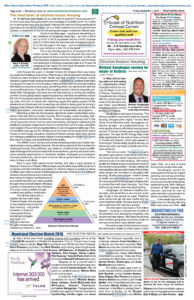The most basic of election issues: housing
Editorial by Mary P Brooke ~ WEST SHORE VOICE NEWS
September 7, 2018
 A roof over your head. Do you take that for granted? House all paid for? Or you’re part-way into paying down your mortgage to a healthy level? Or, maybe you’re among the many who are barely making ends meet and living paycheque to paycheque or contract to contract. Or on a fixed modest income from government (seniors, or disability), or you live off savings at meager investment interest rates.
A roof over your head. Do you take that for granted? House all paid for? Or you’re part-way into paying down your mortgage to a healthy level? Or, maybe you’re among the many who are barely making ends meet and living paycheque to paycheque or contract to contract. Or on a fixed modest income from government (seniors, or disability), or you live off savings at meager investment interest rates.
Or skip to another page… maybe you are renting under conditions of increasing rental rate – up 4.0% in 2018 and up 4.5% in 2019 (surpassed only by a 4.6% increase back in in 2004 when the economy was considered robust).
Or on the last page in the saga… you’re homeless and you live in your vehicle or a tent. Or on the street.
This is the shocking spectrum of housing in BC and indeed across Canada. In the last 30 years the economy galloped ahead for those who found a fast track. For the rest there have been stagnant economic conditions; even for those now employed or building a business there is a 10-year hit dragging at their heels from the Great Recession recovery phase in which everything changed.
Until the past few years, in Greater Victoria for 30 years there was barely any apartment building construction. What forces in the development and financial community were complicit in that? Where was lack of will for municipal zoning change to support more housing development?
Leadership in Langford under Stew Young saw the need for more housing coming and has been pro-actively building affordable housing for several years, something which now seems to be catching on around the province.
A big fan of the Langford model is Victoria mayoralty candidate Mike Geoghegan who sees how the fast-tracking of zoning and building permits not only gets projects happening faster but ultimately somewhat contains the cost of housing because for developers it reduces the pre-build financing carrying costs. And he’s on board with reminding people that getting people off the street and out of tents and into homes they can afford is clearly good for society’s balance sheet. People with accommodation challenges produce a burden to the health care system, community maintenance, and social safety net programs.
Marching up fast into the necessary options for urban communities everywhere is the idea of much smaller housing. Micro housing, cluster housing, high-density condos and smaller townhomes… these are simply necessary now. It may not be everyone’s choice, but the cost of purchasing, owning and maintaining the traditional Canadian single-family home is a dream lost now for many, indeed for most people in the current young generations (Z-gen now approximately age 18-to-23 and Millennials age 24-31). Studies show the under-30 set would rather spend money on technology, education, travel and lifestyle choices rather than owning and managing residential property. Maybe it’s about settling for something in which they have no choice, but nevertheless it’s the reality.
The NIMBY (not in my back yard) idea of resisting creative and higher density housing is simply getting tiresome. We all end up paying for the troubles of a challenged society. Drug addiction, gun violence, mental anxiety issues and lifestyle challenges that are associated with financial stress, poverty and social dislocation certainly weigh heavily on individuals, families, employees and employers, business productivity, and on each of our tax bills as governments try in various ways to keep us all afloat.

Back to your basic psycho-social studies, let’s take a quick glimpse at Maslow’s Hierarchy of Needs. Without basic security at the base of the pyramid, it is logically and demonstrably impossible (or certainly messy) to achieve a sense of safety upon which a sense of belonging can be built. Once there is a feeling of inclusion among friends and community, then comes the higher manifestations of accomplishment that are made possible through enhanced self esteem. Bringing a person’s full potential to the roadtrack of society is then possible through creativity and selfless contribution.
And all that starts with a reliable roof over one’s head.
That the Greater Victoria region is now experiencing a crisis of basic housing – not just the homeless in tents but many people facing escalating mortgages and rents, it is difficult to see how this gets wholesomely rectified any time soon.
::: As first published on page 2 in the September 7, 2018 print/PDF edition of West Shore Voice News
Back to the Editorials page | Back to the main page

